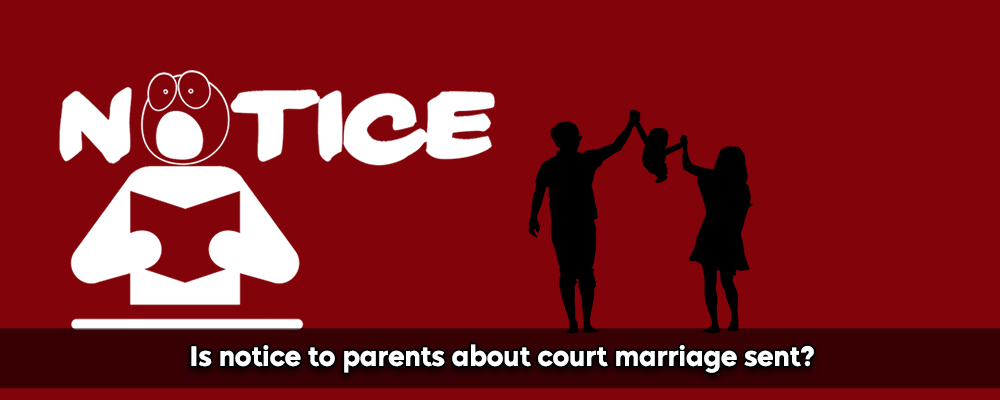To marry in court without telling parents, both parties must go to the local marriage registrar’s office, bring the required paperwork, file a notice of intended marriage, wait for the notice to be published and for no objections to be raised, and then proceed with the marriage solemnization and registration by the Special Marriage Act.
Other alternatives include getting married in a distant state or city, registering a marriage, marrying an Arya Samaj, or getting married online. To guarantee that all legal requirements are met, couples should carefully weigh the possible outcomes and consult with legal counsel.
Need A Legal Advice
The internet is not a lawyer and neither are you. Talk to a real lawyer about your legal issue

Procedure
- Both parties at the local marriage registrar’s office must complete the application for the prospective marriage in person.
- It is required of both parties to present the required paperwork, including proof of address, identity, and age.
- The Registrar of the district where at least one of the parties has resided for at least thirty days before the date on which such notice is provided must receive a notice of the intended marriage from the parties.
- The Registrar of the court where the marriage is to be registered publishes or posts the notice inviting objections to the marriage, and objections can be raised for thirty days after the notice is published.
- The Marriage Registrar can proceed with the solemnization, and registration of the marriage once the thirty-day time has passed, and there are no objections.
- The Marriage Registrar upon the solemnization and registration of the marriage, serving as official documentation of the union, issues a certificate of marriage.
Different Court Marriage Options without Notifying Parents
If a couple wants to get married in court without telling their parents, they have a few options. Among them are:
- Matrimony of Arya Samaj: A sacred fire is used in the ceremonies of an Arya Samaj marriage, which are akin to those of a Hindu wedding. Both the Hindu Marriage Act of 1955 and the Arya Samaj Marriage Validation Act of 1937 serve as the foundation for its legitimacy. The bride must be at least 18 years old and the groom must be at least 21 to obtain a marriage certificate from the Arya Samaj. Any Arya Samaj temple will issue the certificate following the ceremony, by Vedic customs. Following the acquisition of the certificate, the marriage has to be legally registered at the sub-divisional magistrate’s office.
- The local Marriage Registrar’s office is where couples can select a registered marriage. There is no legal requirement for parental attendance or consent for this process to take place.
- It is a choice for couples to get married outside of their hometown, in a different state or city. By doing this, they may be able to avoid any unwanted attention or parental or family intervention. When choosing one of these solutions, it is necessary to adhere to legal procedures and documentation. To make sure they are adhering to the proper procedure and fulfilling all requirements, couples should seek legal counsel and assistance.
Some Challenges That May Occur When Getting Married in Court Without Telling Your Parents
A couple may encounter several challenges when getting married in secret without telling their parents. Several of these challenges consist of:
- Legal prerequisites: Both parties to the marriage must notify the Marriage Officer of the district where at least one of the parties has resided for at least 30 days before delivering the notice of their intended marriage, according to the Special Marriage Act of 1954. Additionally, this notification is posted in the Marriage Officer’s office and is available for public observation. The couple’s parents or other family members can learn about the marriage if they happen to come across the notice.
- Police Verification: as part of the procedure, the Station House Officer (S.H.O.) of the relevant police station will confirm the residence addresses of both parties. This may make it more likely that parents will find out about the marriage through the police.
Before getting married without telling their parents, couples who take such actions should carefully examine these challenges. They ought to see a lawyer for assistance and legal counsel.
Lead India provides a variety of legal services, including free legal advice and online information. Here, you can ask a legal question and talk to a lawyer.





 Talk to a Lawyer
Talk to a Lawyer